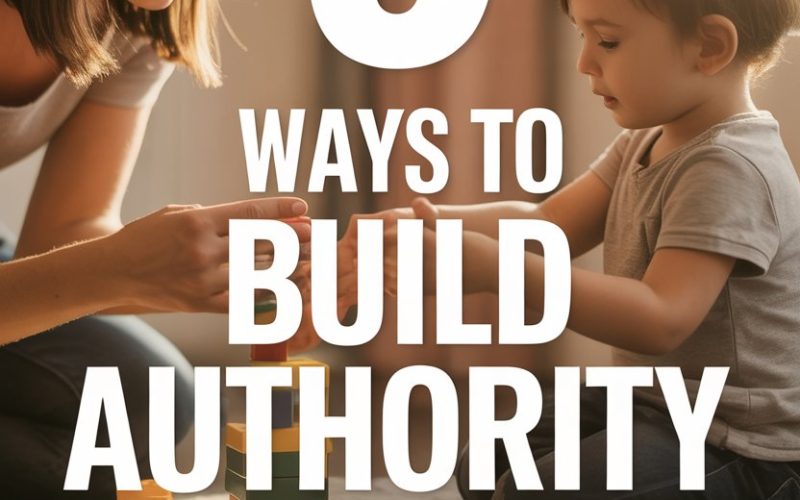Ever tried negotiating with a toddler about eating peas, only to feel like you’re auditioning for a hostage negotiator job you never wanted?
Parenting can feel like that—especially when you want respect and cooperation, but every day seems to involve a new standoff.
The good news: You don’t have to be a drill sergeant (or a pushover) to lead your family. Authority isn’t just about having the loudest voice or the scariest “mum glare.”
It’s about earning trust, setting boundaries, and guiding your child toward good choices—without needing to dole out punishments like parking tickets.
Here’s how to build genuine authority that works for actual busy parents, peas and all.
1. Connection Before Correction
Children are much more likely to follow someone they feel close to, not someone who just yells the loudest (though, yes, sometimes the decibel count does rise). Before addressing unwanted behaviour, focus on the relationship.
This doesn’t mean you have to be your child’s best mate, but showing you “get” them works wonders.
Kneel down to their level, make eye contact, and listen to their version of events—even if it’s wildly creative. “You knocked over the vase because the toy dinosaur needed a bath? Interesting theory.”
Neuroscience backs this up—the brain is wired to learn better when it feels safe and connected.
According to research on emotional intelligence in parenting, children whose parents respond with empathy are more open to guidance and less likely to rebel.
Connection might look like a quick cuddle, a shared joke, or even just a deep breath together before discussing a problem. The more your child feels seen and understood, the more likely they are to trust your lead.
And if you can crack a smile mid-tantrum, you’re basically Mary Poppins.
2. Clear, Consistent Boundaries
Children are obsessed with testing limits. Not because they’re tiny anarchists, but because they need to understand where the boundaries are—and whether you’ll actually stick to them.
Your job isn’t to build an electrified fence, but to put up clear, predictable “fences” your child can see.
If the rule is “no biscuits before dinner,” then that’s the rule, even if their puppy eyes are Oscar-worthy. Consistency is far more effective than threats or lectures.
Psychologists have found that consistency in limit-setting builds a child’s sense of safety and trust in caregivers. It’s less about the rule itself, and more about knowing what to expect.
You can read more about this in research from the Child Mind Institute.
If you do need to change a rule, explain why. “We’re leaving the park now because it’s almost dark, not because I’m trying to ruin your life.”
Announce changes ahead of time when possible. Children who know what’s coming are less likely to push back.
3. Model Respect (Even When You’re Fuming)
Ever heard your own words come out of your child’s mouth and wondered who invited a tiny, unfiltered version of yourself to the dinner table?
Children learn how to treat others by watching you—especially when you’re tired, stressed, or about to step on Lego.
When you make a mistake (and you will), own it. “I snapped at you earlier. That wasn’t fair. I’m sorry.” Apologising isn’t a sign of weakness—it teaches accountability and shows that everyone makes mistakes.
Speak to your child the way you want to be spoken to. “Please put your shoes on now,” instead of “How many times do I have to tell you?”
Politeness doesn’t mean you’re giving up your authority—it means you’re demanding respect by offering it first.
This behaviour rubs off more than you think. According to research from Harvard’s Making Caring Common project, children mirror the way adults talk and listen to others, absorbing what’s considered “normal” in a family.
When you disagree with your child, do it respectfully. You can be firm without being a dictator, like: “I see you’re upset, but it’s not safe to climb the bookcase. Let’s find another way to play.”
That way, you’re leading by example—even if you’re secretly wondering how climbing a bookcase became part of dinner prep.
4. Offer Choices, Not Ultimatums
Power struggles with kids are about as fun as assembling IKEA furniture blindfolded. Giving your child small, age-appropriate choices helps reduce these battles and invites cooperation.
Choices don’t mean children run the show. It’s about offering a sense of control within boundaries you set. “Would you like the blue cup or the green one?” “Do you want to brush your teeth before or after your bath?”
These are not the existential choices of adulthood (“Should I move to the country and raise goats?”), but they give a sense of agency.
Studies on autonomy-supportive parenting show that kids who have some say in daily routines are more likely to cooperate and less likely to resist authority. Because, honestly, who doesn’t like having at least a little say over their day?
If your child picks the “wrong” choice? Unless it’s unsafe or wildly impractical, let them go for it. Choosing their own mismatched socks, or deciding to read three books in bed, rarely ends in disaster.
And if disaster does strike, that’s a learning opportunity for everyone.
5. Teach Problem-Solving Instead of Issuing Orders
When a child ignores instructions or starts World War III over who gets the last biscuit, it’s tempting to lay down the law. But teaching children to solve their own problems is far more effective in the long run (and saves your vocal cords).
Describe the problem and invite their input: “It looks like both of you want the same toy. What ideas do you have to work this out?”
Guide them through brainstorming solutions, even if their first suggestion is “we get two identical toys for everyone forever.” With a bit of patience, you’ll get to something workable.
This approach fosters independence, self-regulation, and creative thinking.
Psychologist Ross Greene, author of The Explosive Child, advocates for collaborative problem-solving and reports sustained improvements in child behaviour and parent-child relationships.
If things get heated, take a break and revisit the issue once everyone’s cooled down. Problem-solving isn’t just a skill for children—it’s a life raft for parents, too.
Authority That Lasts Longer Than a Timeout
Punishments might deliver short-term results, but genuine authority grows from trust, respect, and partnership.
Children who feel understood, respected, and listened to are far more likely to cooperate—even if peas are still a hard sell.
That doesn’t mean the path is always smooth. There will be days when you feel like a referee in a rugby match, and others when you’re more “dishevelled snack dispenser” than “wise family leader.”
But by focusing on connection, consistency, respect, choices, and problem-solving, you’re building the kind of authority that doesn’t need a naughty step.
And when all else fails? Take a deep breath, pour yourself a cuppa, and remember: raising decent humans isn’t about being perfect.
It’s about showing up, setting the tone, and laughing (just a bit) when you find peas in your shoe.




